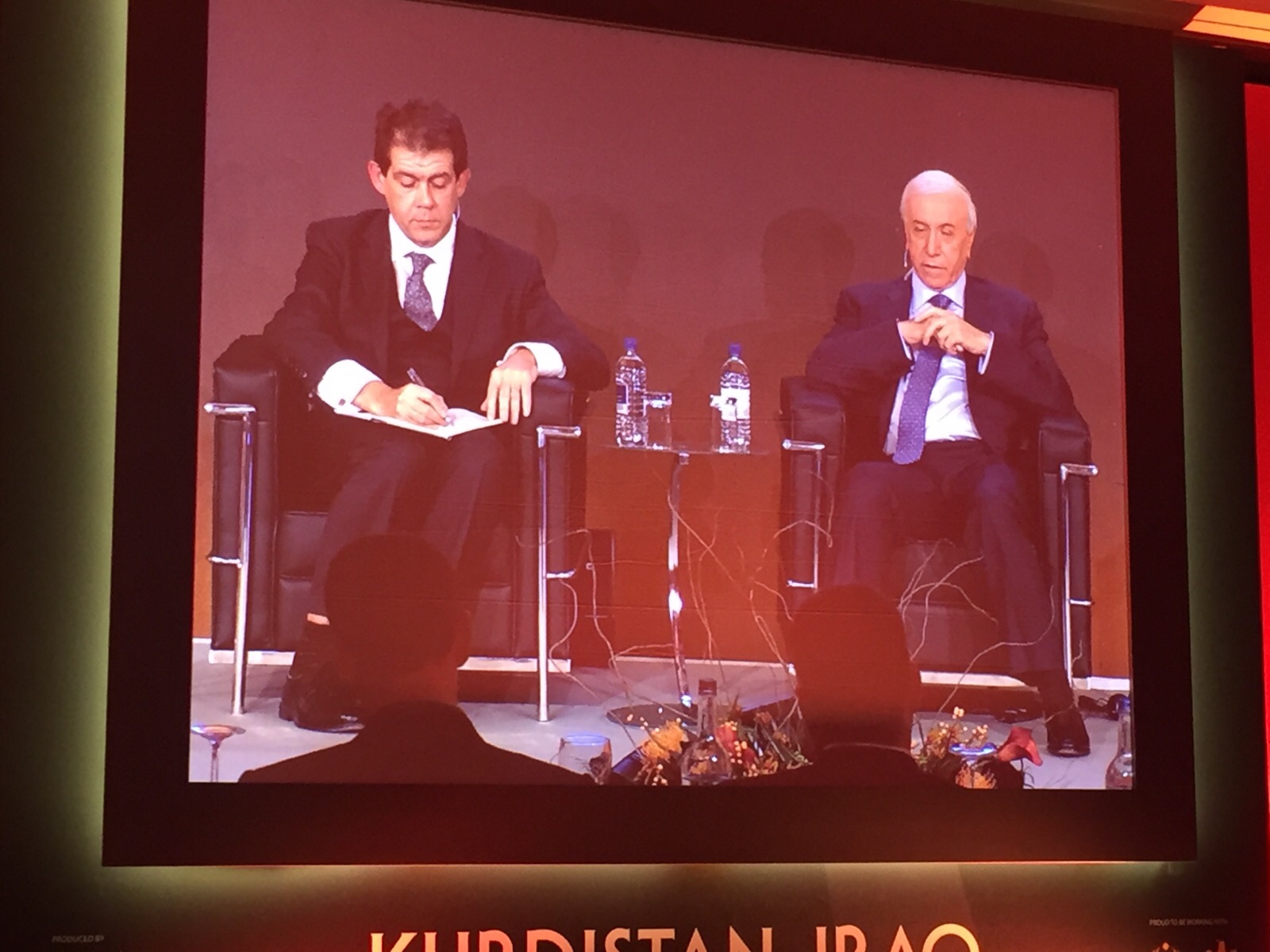
London, UK (mnr.krg.org) – At a major conference on oil and gas in the Kurdistan Region in London last week, political leaders outlined the economic and security challenges facing the Kurdistan Regional Government (KRG) in its fight against ISIS and sheltering a huge number of refugees and IDPs in an era of low oil prices. The importance of the KRG’s plans for fiscal reforms was highlighted, as was the need to pay the Region’s exporting international oil companies (IOCs) to sustain production and revenue levels.
In his keynote speech, Deputy Prime Minister Qubad Talabany said: “Kurdistan is today being tested by a series of crises. Security, humanitarian, political and of course economic.”
Speakers at the conference called for more support for the Kurdish Peshmerga forces’ war against ISIS and for the KRG’s humanitarian assistance to 1.8 million IDPs and refugees.
Natural Resources Minister Ashti Hawrami said: “It is time for the international community and our coalition partners to directly fund the Peshmerga forces. It is an international fight, not just ours, and we deserve more help. We have proven time and again over the last 18 months that we are prepared to fight ISIS.”
Tobias Ellwood, the UK Minister for the Middle East, said: “I met Peshmerga serving in the battle against ISIS and was greatly impressed by their bravery and willingness to defend the Kurdistan Region. The retaking of Sinjar is critical to long-term plans to defeat ISIS.”
Angus McKee, the UK’s Consul General to the Kurdistan Region, said: “We remain committed to a strong partnership with the Kurdistan Region and committed to its stability and security.” He added: “I am optimistic about the long-term future of the Kurdistan Region, which is still open for business.”
Both the Deputy Prime Minister and Minister Hawrami pressed for fiscal reforms to address the economic crisis in the Kurdistan Region. DPM Talabany said: “The first priority area is restructuring expenses. In particular creating a more sustainable salary and pensions scheme. The second and third priority areas for reform are petroleum products and electricity sector respectively. These two areas benefit from large subsidies paid for by the KRG.”
The deputy prime minister also called for unity among Kurdistan’s political parties in the face of the economic, security and humanitarian challenges. Referring to recent political disputes in the Region, Mr Talabany said: “I believe that the worst is behind us...All parties have committed to addressing these disputes through dialogue and negotiations.”
Dr Hawrami echoed these sentiments: “The political leaders and parties of Kurdistan should rise above party politics to tackle economic and other problems. The political leaders, whatever their differences, must protect Kurdistan’s economy for the well-being of our people.”
DPM Talabany acknowledged the work of the international oil companies in the Region, saying: “We will continue to make our arrears payments to the IOCs so that they continue investing in the infrastructure thus increasing our production and export capabilities. We truly appreciate the patience of our IOC partners, and we will repay that faith with continued determination to meet our financial obligations.”
Minister Hawrami, said: “KRG is committed to honouring all terms and conditions of the production-sharing contracts with IOCs. We are continuing regular payments to IOCs to cover their costs and help them reinvest.”
Ian McDonald, Vice President at Chevron, said, “We are encouraged by the KRG’s ability to find new markets in an era of low and volatile prices. And we are encouraged by our exploration results at Sarta block.”
Kurdistan Region’s future role as a gas producer was also highlighted at the conference. After domestic gas priorities are met, the KRG plans to export gas to Turkey and Europe.
Tony Hayward, Chairman of Genel Energy, said that two years ago he talked about Kurdistan becoming a major oil exporter, and that vision is now a reality. Genel Energy and other companies are also developing gas resources. He said, “Gas discoveries so far are enough to support annual exports of 20 billion cubic metres (bcm) to Turkey in four to five years. Gas to Turkey is far more strategic than oil; it will cement KRG’s relationship with Turkey.”
The KRG in 2013 made an agreement with Turkey on gas supplies. The agreement will allow Turkey to diversify its gas sources away from its current suppliers, and will provide a route for KRG to export gas to Europe, a strategy that has received support from the international community.
Minister Hawrami said that the KRG is also looking at enhancing its energy cooperation particularly on oil and gas swap arrangements with Iran.
- Details
- Category: PRESS RELEASES
- Published: 08 December 2015
- Hits: 5355
